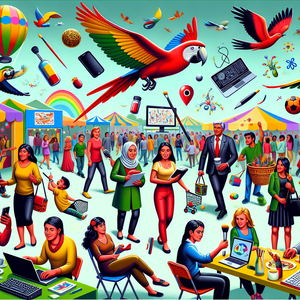The Future of Urban Logistics in Chicago

Chicago's notorious traffic congestion presents significant hurdles for logistics companies striving for efficiency. To mitigate delays and enhance delivery performance, many firms are turning to smart routing technologies. These systems leverage real-time traffic data and predictive analytics to optimize delivery routes, thereby reducing travel times and fuel consumption. For example, Coyote Logistics, a prominent player in the Chicago logistics landscape, has integrated advanced software that analyzes traffic patterns and suggests alternate routes. By doing so, the company not only expedites deliveries but also minimizes environmental impacts associated with prolonged idling and congestion. Such innovations are critical in a city where traffic can often dictate business success.
Sustainable Practices
In response to growing environmental concerns, Chicago's logistics sector is actively pursuing greener alternatives. Many companies are incorporating electric vehicles (EVs) into their fleets, recognizing the dual benefits of reducing emissions and lowering operating costs. A noteworthy example is the partnership between UPS and the City of Chicago, which involves testing electric delivery vans in urban areas. This initiative aligns with the city’s broader goals of reducing greenhouse gas emissions and promoting sustainable urban development. As logistics companies continue to embrace EVs, they not only contribute to cleaner air but also enhance their public image as responsible corporate citizens.
Embracing Technology for Efficiency
Technology is a cornerstone of innovation in urban logistics. Companies are increasingly leveraging the Internet of Things (IoT) and automation to optimize operations. IoT devices facilitate real-time tracking of shipments, enhancing visibility in the supply chain and improving customer service. Moreover, automation in warehouses is becoming more prevalent. Major players like Amazon have adopted autonomous robots for sorting and packing goods, significantly increasing efficiency. These technologies empower human workers to focus on more complex tasks, thus enhancing overall productivity. As logistics companies in Chicago adopt these technologies, they position themselves to meet rising consumer expectations in a digital age.
Collaboration and Shared Resources
To address urban logistics challenges, collaboration among companies is becoming increasingly necessary. Shared warehouse spaces and transportation networks are emerging as effective solutions for optimizing resources and reducing costs. A prime example of this is the collaboration between small logistics firms and larger companies to share distribution networks. This approach allows smaller firms to access larger markets without the overhead costs associated with maintaining their own infrastructure. Such partnerships can foster innovation, increase efficiency, and ultimately lead to improved service offerings for customers.
Supporting Examples
Recent initiatives aimed at enhancing urban logistics further illustrate Chicago's commitment to innovation. The Chicago Department of Transportation has launched the “Chicago Freight Plan,” which focuses on improving freight movement through enhanced infrastructure and technology. This plan emphasizes stakeholder engagement, ensuring that logistics companies can voice their needs and collaborate on solutions that benefit the entire sector. Moreover, during the COVID-19 pandemic, many logistics companies rapidly adapted to the surge in e-commerce demand by implementing contactless delivery options and expanding last-mile delivery services. This shift not only met consumer needs but also highlighted the agility required in urban logistics. Companies like DoorDash and Instacart thrived in this environment, showcasing how adaptability can lead to success even in challenging circumstances.
The future of urban logistics in Chicago appears promising, characterized by innovation, collaboration, and a commitment to sustainability. As logistics companies navigate the complexities of urban challenges, their readiness to embrace new technologies and practices will define their success in the years ahead. By prioritizing efficiency and environmental responsibility, Chicago's logistics sector is not merely adapting to change but is actively shaping a more sustainable and efficient future for urban logistics. As the city continues to evolve, so too will the strategies that drive its logistics operations, ensuring that Chicago remains a vital player in the global supply chain landscape. By leveraging technology, fostering collaboration, and committing to sustainability, Chicago's logistics industry is poised for a transformative future that will benefit businesses and residents alike.
Urban Logistics Manager
Coyote Logistics, UPS, Amazon
Core Responsibilities
Develop and implement strategies to optimize delivery routes, addressing traffic congestion and improving efficiency.
Collaborate with local government and transportation agencies to enhance urban freight movement.
Oversee the adoption of sustainable practices within logistics operations, including the integration of electric vehicles.
Required Skills
Strong analytical skills for route optimization and data analysis.
Excellent communication skills for stakeholder engagement and collaboration.
Experience in sustainability initiatives and knowledge of electric vehicle technologies.
Supply Chain Data Analyst
DHL, FedEx, Target
Core Responsibilities
Analyze real-time traffic data and predictive analytics to inform routing and logistics decisions.
Create dashboards and reports to track key performance indicators for logistics operations.
Collaborate with IT teams to implement IoT solutions for shipment tracking and visibility.
Required Skills
Proficiency in data analysis tools and software (e.g., SQL, Python).
Strong problem-solving abilities and attention to detail.
Experience with supply chain management and logistics analytics.
Warehouse Automation Specialist
Amazon, Walmart, Ryder System
Core Responsibilities
Design and implement automated systems and robotics for sorting and packing goods in warehouses.
Conduct regular assessments of automation systems to enhance operational efficiency.
Train staff on new technologies and automated processes to improve productivity.
Required Skills
Strong understanding of robotics and automation technologies.
Experience with warehouse management systems (WMS).
Mechanical and technical troubleshooting skills.
Last-Mile Delivery Coordinator
DoorDash, Instacart, Postmates
Core Responsibilities
Plan and execute last-mile delivery strategies to meet the growing demand for rapid delivery services.
Manage partnerships with local delivery services and independent contractors.
Monitor delivery performance metrics and implement improvements for customer satisfaction.
Required Skills
Strong organizational and project management skills.
Familiarity with e-commerce platforms and logistics software.
Excellent customer service skills to manage client relationships effectively.
Sustainability Officer in Logistics
UPS, FedEx, Chicago Department of Transportation
Core Responsibilities
Develop and oversee sustainability initiatives, focusing on reducing carbon footprints and enhancing eco-friendly practices.
Coordinate with various departments to implement green technologies, such as electric vehicle fleets and renewable energy sources.
Monitor compliance with environmental regulations and report on sustainability metrics.
Required Skills
Strong background in environmental science, sustainability, or related fields.
Knowledge of regulatory requirements and sustainability certifications.
Excellent communication and leadership skills to advocate for sustainable practices across the organization.


